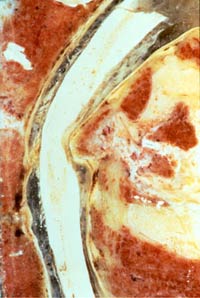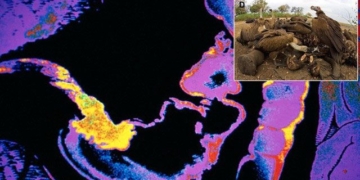Two Antibodies to Regenerate Severed Spinal Nerves in Mice Set for Human Trials.
These antibodies have enabled injured mice to walk again. They block the activity of Nogo—a type of protein that prevents nerve cells from forming new connections.
 |
| Image of human spinal cord during autopsy (Photo: VNN) |
However, some experts are concerned that blocking Nogo may not effectively control the regeneration of nerve cells in the brain or spinal cord. It is also unclear how this therapy would be applied to humans.
Martin Schwab and his team from the University of Zurich (Switzerland) used pumps and catheters to deliver two types of antibodies, 11C7 and 7B12, into the cerebrospinal fluid surrounding the injured spinal cord of mice.
The results indicated that these antibodies successfully regenerated the axons—thread-like connections that link nerve cells—allowing the mice to swim, jump, and walk.
Additionally, the antibodies did not cause hyperalgesia—a condition in which even light touches cause pain in the mice—due to incorrect connections between nerve cells.
In collaboration with the pharmaceutical company Novartis, Schwab’s team has developed human-compatible antibodies. He stated that the team plans to conduct clinical trials in the near future, lasting 2-3 years.
Robin Franklin, a neuroscientist at the University of Cambridge, remarked: “There is sufficient experimental evidence to be optimistic about these trials.”
According to Lisa Schell, a member of the research team, Nogo alone cannot fully restore the mice. It may be a factor that needs to be combined with other methods to treat spinal cord injuries.
Geoffrey Raisman from University College London is researching the necessary stimulants for nerve regeneration. He does this by implanting cells taken from the back of the nose into the spinal cords of patients. These cells are known for their ability to stimulate the regeneration of damaged nerve fibers.
This method has shown promising results in paralyzed dogs, which regained movement in their legs after the procedure. Clinical trials are expected to start later this year.
Nick Jeffery, a veterinary surgeon at the University of Cambridge, has conducted similar tests on dogs. He warns against translating animal results directly to humans. Blocking Nogo in humans could have unknown effects on the body.
Minh Sơn (According to NewScientist)


















































